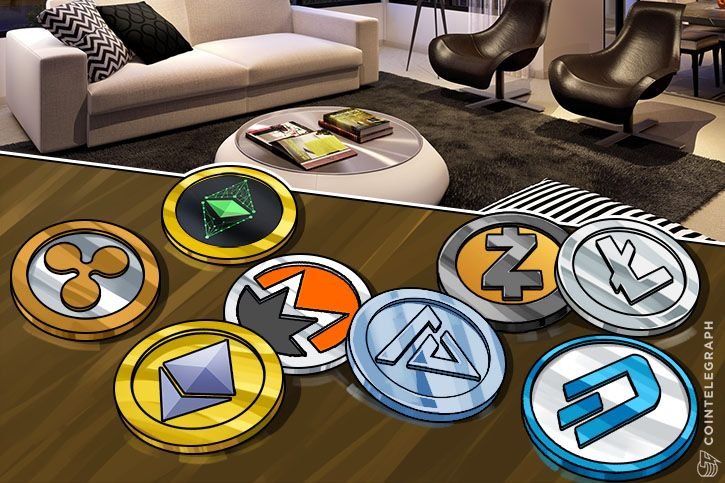Blockchain currency is revolutionizing money. Since Satoshi Nakamoto unveiled his cryptocurrency in 2008, we’ve witnessed a proliferation of digital cash companies and codebases. Utilizing his public, distributed ledger, dozens of promising currencies have emerged. Only a select few have proven themselves as true contenders to Bitcoin, however.
Here are the top 10 altcoins on CoinMarketCap (note that the list is changing constantly, especially in the tail part, with other altcoins like MaidSafeCoin, Golem and Augur playing musical chairs with others):
Ethereum
J.P Morgan Chase, Microsoft and Intel allied in order to create the fiercest rival to Bitcoin in circulation today: Ethereum. The main purpose of the endeavor was to program binding agreements into the Blockchain itself. This incarnated into the now-popular smart contract feature.
Interestingly, Ethereum is not just a currency. It’s a Blockchain platform powered by the Ether cryptocurrency. The New York Times describes the technology as “a single shared computer that is run by the network of users and on which resources are parceled out and paid for by Ether.”
Ripple
Ripple attracted a great deal of venture capital during its inception. The Google-backed altcoin startup managed to pull in upwards of $50 mln from banking institutions, gathering an impressive $90 mln in total funding. Ripple is unique in that it allows for transacting with any unit of value, from fiat currency to frequent flier miles.
“Ripple provides global financial settlement solutions to enable the world to exchange value like it already exchanges information giving rise to an Internet of Value (IoV). Ripple solutions lower the total cost of settlement by enabling banks to transact directly, instantly and with certainty of settlement,” reads the company’s copy on their official website.
Initially a middling contender, Ripple has gained momentum in the cryptocurrency market, seeing a marked surge earlier this year. Monero
Monero is geared toward those who desire greater anonymity. The cryptocurrency allows you to “send and receive funds without your transactions being publically visible on the Blockchain.” Transactions are completely untraceable due to Monero’s leveraging of ring signatures. Unfortunately, because of Monero’s emphasis on privacy, it has seen adoption by the darknet and other criminal organizations.
Zcash
Zcash, like Monero, offers greater privacy to users. Unlike Monero, transactions are shielded rather than made completely private. Meaning, the details of the transaction itself, such as the users involved and the amount traded, are hidden. Zcash does this by using a “zero-knowledge” proof that allows for parties to exchange funds without revealing each other’s identity.
Decred
Decred’s primary aim is to focus on “community input, open governance and sustainable funding and development.” The currency melds proof-of-work and proof-of-stake mining algorithms to ensure a minority of users do not own the majority of the funds and that decisions are led by the community rather than a handful of developers or early investors.
PIVX
PIVX stands for Private Instant Verified Transactions. Another open-source decentralized Blockchain currency, it is built upon Bitcoin Core. Like Zcash and Monero, PIVX boasts its heightened privacy and security.
“[W]e believe that you have the right to exchange privately and securely, without interference from corporatocracy pressures, governmental influences, prying eyes, and nefarious individuals and movements,” PIVX contends.
PIVX is highly volatile, experiencing massive spikes in trading volume and valuation as of March of this year. Again, because of the currency’s emphasis on privacy, PIVX is susceptible to criminal activity.
Cryptocurrencies, Bitcoin and the altcoins it has spawned, may bring about a new global economy. They allow us to transact in a peer-to-peer fashion, without third-party bodies governing us. Bitcoin introduced the Blockchain, but other developers are quickly improving upon Nakamoto’s idea. Some currencies have focused on speed, as is the case with both Ripple and Litecoin. Others have honed in on privacy, currencies like Zcash going so far as making all transactions private and untraceable. Each altcoin comes with its own strengths and weakness. Surely, we’ll discover more as time goes on. For now, these 10 

Hi! I am a robot. I just upvoted you! I found similar content that readers might be interested in:
https://cointelegraph.com/news/top-10-altcoins-all-you-wanted-to-know-about-bitcoins-contenders
Congratulations @arvinsharma! You have completed some achievement on Steemit and have been rewarded with new badge(s) :
Click on any badge to view your own Board of Honor on SteemitBoard.
For more information about SteemitBoard, click here
If you no longer want to receive notifications, reply to this comment with the word
STOP